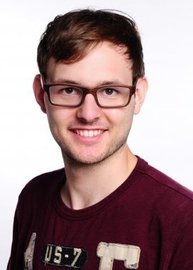Arbeitsbereiche
Early Stage Researcher at the Institute for Medical Information Processing, Biometry, and Epidemiology
Kontakt
Marchioninistraße 15
81377 München
Raum:
K U1 840
Telefon:
+49 (0)89 / 440074494
E-Mail:
sbuchka@ibe.med.uni-muenchen.de
Arbeitsgruppe
Prof. Mansmann
Research Interest
Multiple sclerosis (MS) is an incurable autoimmune inflammatory disease of the central nerve system (CNS). MS is characterized by several symptoms such as disability, which are caused by focal inflammations of the CNS. In general, the symptoms persist for a few days to weeks. But in some cases, the symptoms persevere months. After such disease attacks respective so-called relapses, the symptoms recede partially or completely.
Despite many developed disease-modifying treatments (DMT), MS cannot be cured. Because of this, more effort should be invested in research developing new therapies, but also into research improving existing treatment approaches. Given the complexity and individual course of MS, a personalized medical approach promises to be the method of choice for developing association studies or prognostic models. In spite of the convincing results of the prognostic factors found, the evidence is often only given at a group level and not from an individual perspective.
In general, to demonstrate clinically relevant prognostic factors like lesions in T2 magnetic resonance images (MRI) lasts long and complicates the implementation of the personalized medicine approach. To avoid long-lasting studies and to evaluate the therapy strategy, surrogate endpoints like MRI image evaluations are considered. This evaluation of lesions as a surrogate for the treatment effect of interferon-beta-1a and glatiramer acetate shows promising results on an individual level. However, it remains unclear whether the MRI evaluation or other potential factors could serve as a surrogate in the individual context. Therefore, in my project I want to focus on validating MRI-related surrogates on an individual level under different therapeutic strategies.
Supervisors
Prof. Ulrich Mansmann
Dr. Sabine Hofmann
PD Dr. Joachim Havla (Klinikum GH)
Curriculum Vitae
EDUCATION
· 09/2001 - 07/2005 primary school of Lochham (Gräfelfing)
· 09/2005 – 07/2013 Pestalozzi gramma school (Munich)
· 10/2013 – 09/2016 Ludwig - Maximilians - Universität (Munich), Biology Bachelor
· 10/2016 – 09/2017 Technische Universität München, Molecular Biotechnology Master
· 10/2017 – 09/2019 Ludwig - Maximilians - Universität (Munich), MSc Epidemiology
· 01/2020 – to date PhD Student at the Institute for Medical Information Processing, Biometry an Epidemilogy
WORK EXPERIENCE
· 07/2013 – 09/2013
Internship at a biotechnological company (“Silantes”)
· 06/2015 – 08/2015 and 11/2015 – 12/2015
Research assistant at the working group of Prof. Dr. Caroline Gutjahr (LMU)
· 10/2017 – 12/2017
Research assistant at the "Multiplikatoren Programme" of the LMU under the direction of Dr. Ursula Berger and Dr. Michaela Coenen (both staff members of the Institute for Medical Information Processing, Biometry and Epidemiology (IBE) at the LMU)
· 05/2018 – 09/2018
Internship at the Federal Office for Radiation Protection in the Department of Radiation Epidemiology and Risk Assessment under the direction of Dr. Nora Fenske
Publications
Carbonnel, S., Torabi, S., Griesmann, M., Bleek, E., Tang, Y., Buchka, S., . . . Gutjahr, C. (2020). Lotus japonicus karrikin receptors display divergent ligand-binding specificities and organ-dependent redundancy. bioRxiv, 754937. doi:10.1101/754937


